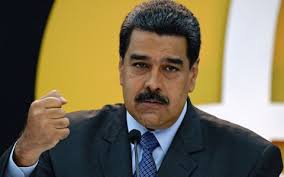Caracas, March 6: Sanctions have worsened Venezuela’s crippling economic and political crisis, the UN human rights chief said Wednesday, as Washington warned it may expand measures targeting President Nicolas Maduro’s socialist government.
UN rights chief Michelle Bachelet said sanctions had exacerbated the crisis but also slammed Maduro’s “violations of civil and political rights” in her annual report to the UN Human Rights Council in Geneva. “Venezuela clearly illustrates the way violations of civil and political rights — including failure to uphold fundamental freedoms, and the independence of key institutions — can accentuate a decline of economic and social rights,” said former Chile president Bachelet.
Venezuelans have been battered by an economic meltdown, shortages of food and medicine and a bitter political standoff between Maduro and opposition leader Juan Guaido — who has been recognized as interim president by more than 50 countries.
“This situation has been exacerbated by sanctions,” Bachelet said. Washington, which has recognized Venezuela’s opposition chief Juan Guaido as the country’s leader, imposed sanctions on Venezuela’s state oil company PDVSA last month.
It has also handed Guaido control of Venezuela’s bank accounts in the United States. The US envoy for the crisis in Venezuela, Elliott Abrams, said Tuesday that Washington was weighing more punitive measures to increase the pressure on Maduro. Guaido vowed Tuesday to increase pressure on Maduro, who in turn promised to crush a “crazed minority” that wants to remove him from power.
The 35-year-old National Assembly leader returned home to a hero’s welcome on Monday, having defied a ban on leaving the country to embark on a 10-day tour of South American allies. He remains free despite the threat of arrest by the government. “They thought the pressure had reached its zenith, but it’s only just beginning,” Guaido told reporters.
On Tuesday, a national holiday, he met public sector union leaders. “Public sector workers have lost practically all their rights, we have no other option but to call for a civic strike,” said Guaido, without giving further details. Maduro, meanwhile, pressed his supporters to hold “anti-imperialist” marches Saturday to counter fresh protests planned by Guaido.
“Today more than ever, we are victorious against the conspiracy, against blackmail, while a crazy minority continues with their hatred,” he said in his first public comments since Guaido’s return. When he returned to Caracas — his latest challenge to Maduro’s authority — Guaido announced to tens of thousands of supporters his plans for new protests.
He has vowed to set up a transitional government and hold new elections. US envoy Abrams said that given Maduro’s low popularity, it would be “a gift” if he decided to run in fresh polls. “That’s ultimately a decision for Venezuelans to make,” Abrams said. As part of his challenge to Maduro, Guaido is attempting to take control of the state bureaucracy, which he considers to have been “kidnapped” through blackmail and persecution.
Unions from the oil industry, basic services, the public bank and local government took part in Tuesday’s meeting, union leader Ana Yanez told AFP. “The public administration is practically paralyzed. In the town halls, people only go to work three days a week and even then barely half the day,” said Yanez.
Maduro finally made an appearance in the late afternoon to lead a military parade paying tribute to his predecessor Hugo Chavez on the sixth anniversary of the socialist firebrand’s death. Standing in front of Chavez’s mausoleum, Maduro also called on his supporters to take to the streets Saturday, to mark “four years since” then-US president Barack Obama first announced sanctions against the socialist government.
Maduro has done this before, calling his own counter-demonstration every time Guaido announces a protest. Both attract thousands of supporters, but the opposition gatherings usually have the edge in numbers. Maduro had been active on Twitter earlier in the day, again paying tribute to Chavez.
“Thanks to your teachings and your example we’re continuing the permanent fight against those who tried so many times to extinguish your voice,” wrote Maduro. During his travels, Guaido met US Vice President Mike Pence and the leaders of Colombia, Brazil, Argentina, Paraguay, Chile and Ecuador.


